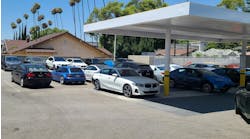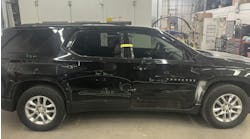I've been described many times as someone who is “black & white.” My views are oftentimes one way or the other with virtually no grey areas. In the spirit of the recent “surprises,” most of us were not prepared for, or saw coming for that matter, I'm going to change briefly to “green & red.” The red unfortunately is not welcomed, as it's usually associated with “stop.” We have little control over that at this time. The good news is that I will prepare you for the green light. We all know what that usually means.
I'm not going to go over the reasons or even attempt to purpose a distance to the finish line for the current situation facing our country, or the world for that matter. I'm going to spare you the terms that are all over the media. You know what it is, and these are uncharted waters. I'm certainly not an economist or a soothsayer {Google word definition break inserted}. Welcome back! I just taught you a new word, it's fun to say, isn't it?! I hope that it made you smile, but we must return to the subject at hand. As I'm writing this it could be just the beginning of a long recovery, or at the very best a short slowdown, for collision repair shops and all the associated industries linked with us. There are many when you stop to think about it. I'm going to help you stay focused and benefit from it the best way possible. Before we get into the what and hows, I'll share some background that I hope will help you understand my take on this.
As you may know, most of my career was spent as a technician on the shop floor, or “front lines” as it were. I worked mostly as a flat-rate technician. Most of you reading this will know what that is, but for those of you that don't, it's a simple pay plan. I was paid for the hours I turned per week. Not the hours I was clocked in or physically there but by the number of hours I completed as it related to the work order. If I was on location for 40 hours that week but completed 60 hours of billable hours I was paid 60 hours times my rate. Simple, right? What was not so simple was when there was a work shortage for whatever reason. Fortunately, there were few in my years as a technician, but they were painful nonetheless. I should tell you that when it happened, even if I was being paid hourly/salary by the shop, it was just as disturbing.
I had heard most of every typical explanation that was out there. The holiday season, vacation season, schools starting back after the summer break, tax season and the list goes on, but you get the idea. Of course, it was always planned that there would be reserves and other budgeting tactics in place to help monetarily in the event of a slow-down. I always wondered if my wife was somehow behind the fact I never received a monthly Cornwell Tools sales flyer when it was near time for a vacation. I'll probably never know. Offering full disclosure here, our reserves were usually raided for a well-planned but poorly executed vacation or other large purchase such as a boat, car or off-road vehicle. No regrets at our house. I'm hoping the family vacations and outdoor adventures will be priceless memories for our children. So that leaves the reality that with the best-laid intentions there are pitfalls occasionally. Unfortunately, the current situation is out of our control with not even a mirror to blame.
When it became slow in the shop, as a technician, I had two choices. I could go home, or I could stay busy and regroup so that when the work came back in the doors my efficiency would be increased. Both options were nonpaying events for me. I would never argue about a person's position to leave the shop if they had that option. This goes to personal choice when given the two options and neither is wrong. I'm making myself look pretty good here, but I'll be honest. In reality, I've never been one to “sit around” with nothing to do. The other component was that if a vehicle came in to be worked on I wanted to be there and ready. It may be that some laws require a person, normally paid flat-rate, to be compensated at the very least minimum wage if clocked in for a certain amount of hours. That for me is all hearsay, and I never had that applied in my situation. I would recommend checking federal, state or local laws that would address those scenarios.
When I stayed at the shop with nothing to work on I would find ways to be more efficient as I alluded to earlier. I would organize (read “organize” as more of a throwing junk away) my toolbox, fix or maintain tools that required attention. I would often expand my organization out to my entire area if time permitted. My personal selection of non-typical clips, screws, and nuts would be sorted and often times grouped per manufacturer. It was common to receive more fasteners than were required when ordered. It was also common the extras were not returned, so I would keep them for future use if needed. Things are somewhat different in today's world in that regard, but you get the point. Find things to “fix” or organize with the goal of being more streamlined when the workflow returns.
Organization was one of my tactics to keep busy and pass the time while having a positive return at a later time. I would purpose this same mindset can be used today for shops on a larger scale. If the shop has the ability to afford partial or full compensation to employees in the absence of the normal workflow use this time for the overall benefit of the shop. Most, if not all, businesses have several factors at play during the normal course of production. The employees have the means to be compensated and the business can make a profit for the support of employees, as well as the owner, and future sustainability. Sometimes it is a good thing to be able to step back and look at the big picture. A worldwide event like we are all experiencing, unfortunately, has afforded us all the time to do just that. I'm not one to ever panic, because it clouds vision. Owners and those in management must do their best to make a bad situation as painless as possible. Notice my word choice there — “painless.” Unfortunately, we all in some way will feel some, if not a lot, of pain as a result of the situation. It can be minimized by utilizing the available, albeit nonstandard, amount of time we have to help ensure our success on the other side of the slow down.
Now may be a good time to address the shop layout. Is that structure repair equipment better suited in a different location? Is the detail area in need of attention? Can the office be reconfigured into a more productive space? Maybe now is the time to create that kid-friendly play area you've been wanting to do for some time. Is the outside of the shop in need of a general cleaning? The parking lot may be better in a different configuration. Are the dumpsters in their best location? Is there a dedicated recycling area in place? Is it functioning as best that it can be?
I've touched on some physical changes that may be addressed, but are there operating changes overdue? Is now the best time to implement a lean process of sorts? Don't forget that now may be a great time to take on an apprentice. You've told yourself lately you didn't have time to do it right? Now you have time. What are the other things you've been telling yourself you didn't have time for? Organizing your records? I'm sure there are many items if you take a minute to recount them. Now is a good time to reach out to vendors, suppliers, and others that cross a shop's path. We're all in this together. Your concern for them is most likely mutual. It's probable they too are a small business in uncertain times. Just a bit of communication may make all parties more comfortable.
Associations and training can benefit from your available time here. When I mentioned training you probably didn't get uncomfortable. At least I hope you didn't! I can change that with one word, probably. Are you ready? Safety. There, I said it. As I am an I-CAR-employed In-Shop Knowledge Assessor that travels all over the country to shops small and large, I can tell you it's an uncomfortable topic for most owners, managers, and technicians. Why is that? I have a theory. It's uncomfortable because we only visit it occasionally consciously. Of course, we all practice it day in and day out, but we tend to not think much about it. I'll give an example. Does your shop have a designated meeting area in the event of a fire or other emergency such as a chemical spill that would require evacuation? Have you done any types of drills or even discussed the “what ifs?” Everyone knows about ABC, typically red-colored, fire extinguishers, right? What other type is recommended for a shop? Don't know? Now you have homework to do. Are your SDS sheets in order? More for you to do. I-CAR has a suite of online courses that cover these very topics. They obviously have a lot of new technology-related courses as well. We all know the speed that it’s coming at us is unprecedented!
Now is a good time to get involved with associations and committees. There is not enough time here to go into it, but I'll point you in the right direction. State, local and I-CAR committees are out there. Maybe it's also a good time to do your part to strengthen our industry. Schools are a good place to start for that. Trade associations and the like are waiting for your involvement. You can look into SCRS, ASA, CIC, and others if you haven't already.
I've given you, up to this point, some things to do that will make you more efficient down the road if there is a work stoppage or slow down. Keeping busy will pass the time and strengthen your vision. In closing, I will provide another way to look at it outside of the shop. Most forms of automobile racing rely on critical and in-depth preparations for success. Think of this as a pit stop that we have all seen in automobile races. It's usually akin to what we do. Fix, change and refuel in the quickest way possible to keep competing. This current “pit stop” may be a bit nontraditional and lengthy. The unsuccessful teams may do the minimum and take a break. Do what the best teams would do if they were afforded the time. I challenge you to raise the hood and make any changes that will help.
If time allows, go all over the car (your shop) and make changes or at the very least check everything twice as time allows. Imagine the difference in confidence levels between the two drivers, crew and owners of the respective teams. Be ready at the restart to STEP ON THE GAS! It's gonna go green soon!




